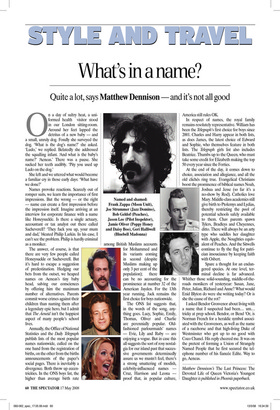What’s in a name?
Quite a lot, says Matthew Dennison — and it’s not all good On a day of sultry heat, a uniformed health visitor stood in our London sitting-room. Around her feet lapped the detritus of a new baby — and a small, unruly dog. Fondly she surveyed the dog. ‘What is the dog’s name?’ she asked. ‘Ludo,’ we replied. Belatedly she addressed the squalling infant. ‘And what is the baby’s name?’ ‘Aeneas.’ There was a pause. She sucked her teeth audibly. ‘Pity you used up Ludo on the dog.’ She left and we uttered what would become a familiar cry in those early days: ‘What have we done?’ Names provoke reactions. Scarcely out of romper suits, we learn the importance of first impressions. But the wrong — or the right — name can create a first impression before the impression itself. Imagine arriving at an interview for corporate finance with a name like Honeysuckle. Is there a single actuary, accountant or tax analyst out there called Sacheverell? ‘They fuck you up, your mum and dad,’ bleated Philip Larkin. In his case, I can’t see the problem. Philip is hardly criminal as a moniker.
The answer, of course, is that there are very few people called Honeysuckle or Sacheverell. But it’s hard to escape a suggestion of predestination. Hedging our bets from the outset, we heaped names on Aeneas’s tiny baby head, salving our consciences by offering him the maximum number of alternatives. Parents commit worse crimes against their children than naming them after a legendary epic hero, but I admit that The Aeneid isn’t the happiest aspect of many people’s school lives.
Annually, the Office of National Statistics and the Daily Telegraph publish lists of the most popular names nationwide, culled on the one hand from the registration of births, on the other from the births announcements of the paper’s social pages. There is inevitably a divergence. Both throw up eccentricities. In the ONS boys list, the higher than average birth rate among British Muslims accounts for Mohammed and its variants coming in second (despite Muslims making up only 3 per cent of the population); there can be no accounting for the prominence at number 32 of the American Jayden. For the 13th year running, Jack remains the first choice for boys nationwide.
The ONS list suggests that, in the words of the song, anything goes. Lucy, Sophie, Emily, Thomas, Oliver and Charlie are perennially popular. Oldfashioned parlourmaids’ names — Evie, Lily and Ruby — are enjoying a vogue. But in case this all suggests the sort of rosy nostalgia for our island past that successive governments determinedly assure us we mustn’t feel, there’s a strong smattering of modish, celebrity-influenced names — Cruz, Harrison and Leona — proof that, in popular culture, America still rules OK.
In respect of names, the royal family remains resolutely representative. William has been the Telegraph’s first choice for boys since 2001. Charles and Harry appear in both lists, as does James, the latest choice of Edward and Sophie, who themselves feature in both lists. The Telegraph girls list also includes Beatrice. Thumbs up to the Queen, who must take some credit for Elizabeth making the top 50 every year since the Forties.
At the end of the day, it comes down to choice, association and allegiance, and all the old clichés ring true. Evangelical Christians boost the prominence of biblical names Noah, Joshua and Jesse (so far it’s a no-show by Rod). Catholics love Mary. Middle-class academics still give birth to Ptolemys and Lydias, thereby restricting the pool of potential schools safely available to them. Chav parents spawn Tylers, Bradleys and Cheyennes, ditto. There will always be an arty type who saddles her daughter with Apple, the Noughties equivalent of Peaches. And the Sitwells continue to fly the flag for patrician insouciance by keeping faith with Osbert.
Spare a thought for an endangered species. At one level, terminal decline is far advanced. Whither those solid-sounding, middle-of-theroads monikers of yesteryear: Susan, Jane, Peter, Julian, Richard and Anne? What would Enid Blyton do were she writing today? Or is she the cause of the rot?
I asked Bendor Grosvenor about living with a name that I suspected had been... um... tricky at prep school. Bendor, or Bend ’Or, is Norman French for a heraldic symbol associated with the Grosvenors, as well as the name of a racehorse and that high-living Duke of Westminster who got up to no good with Coco Chanel. His reply cheered me. It was on the pretext of forming a Union of Strangely Named People that he first secured the telephone number of his fiancée Edíte. Way to go, Aeneas.










































































 Previous page
Previous page